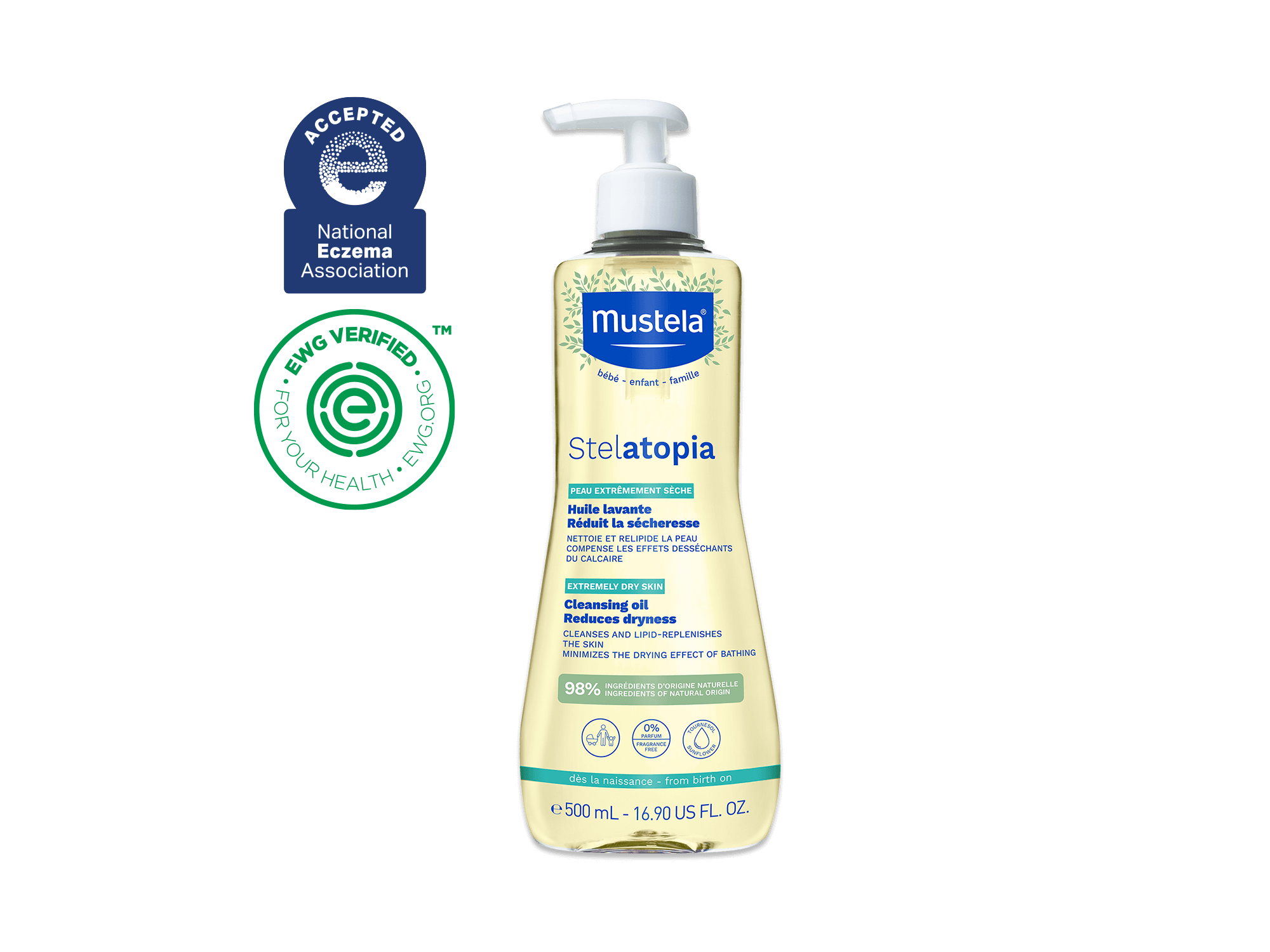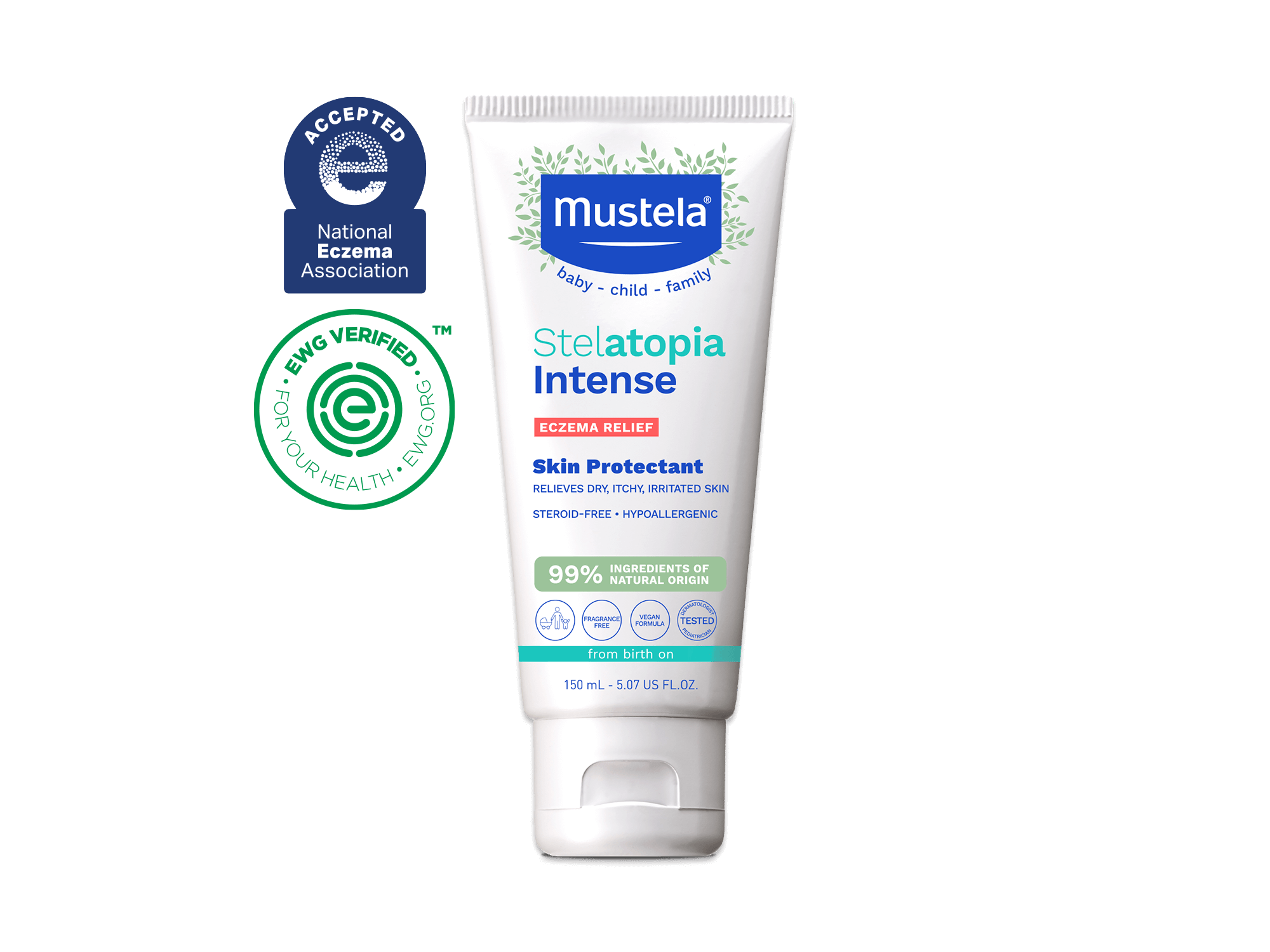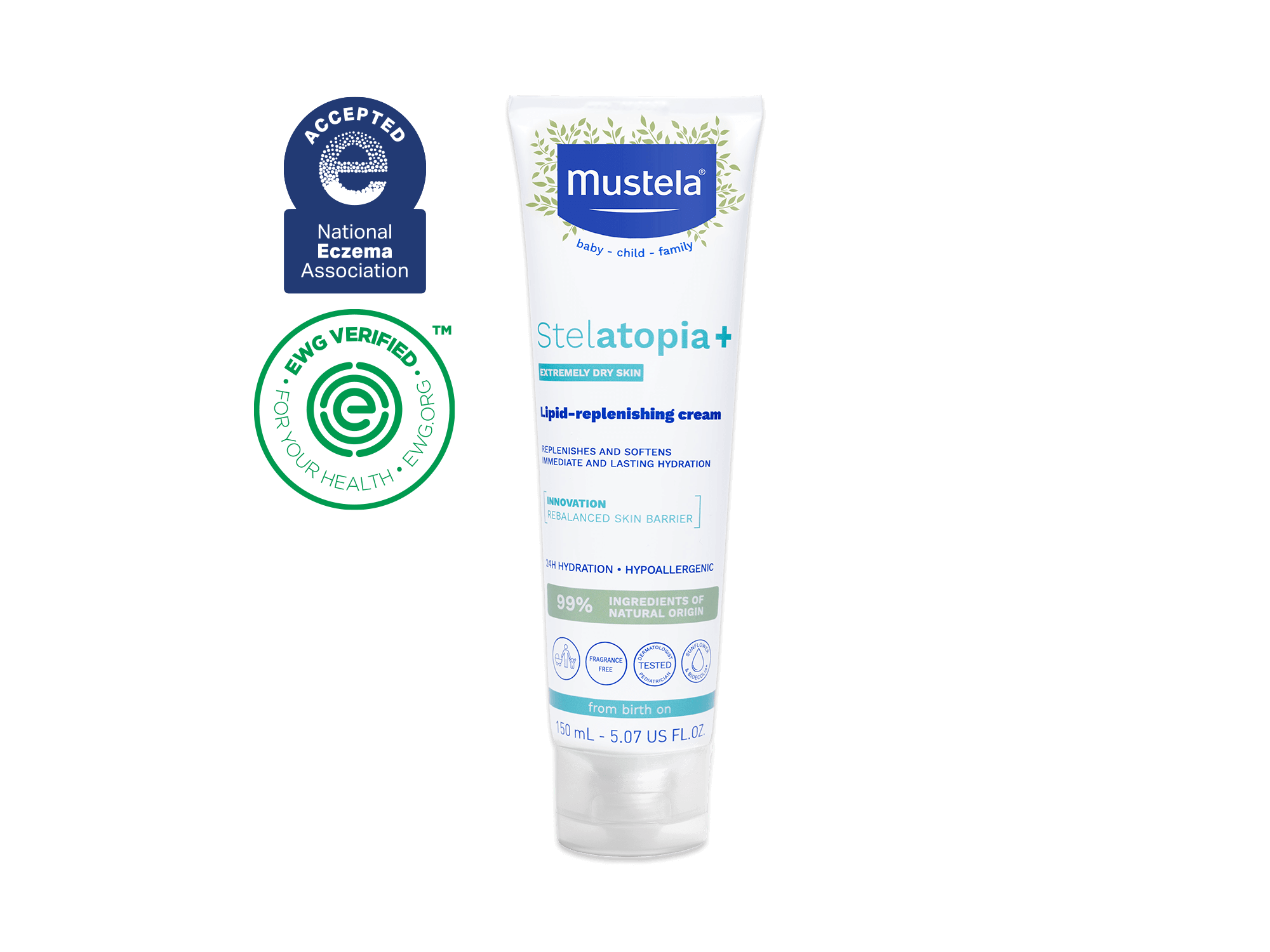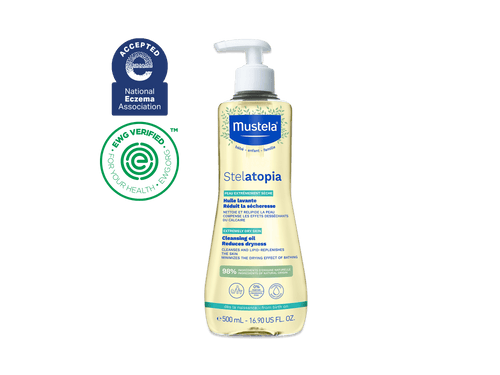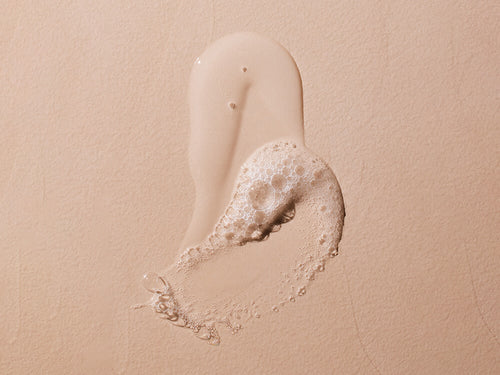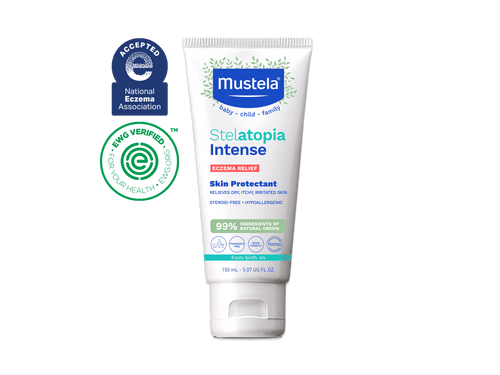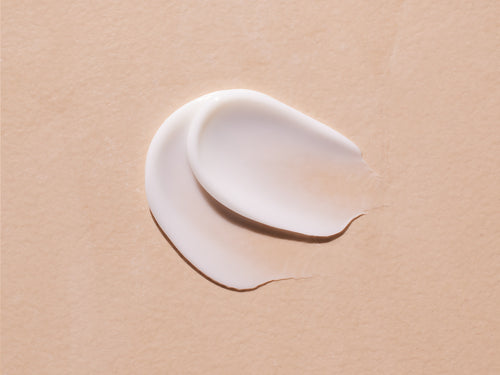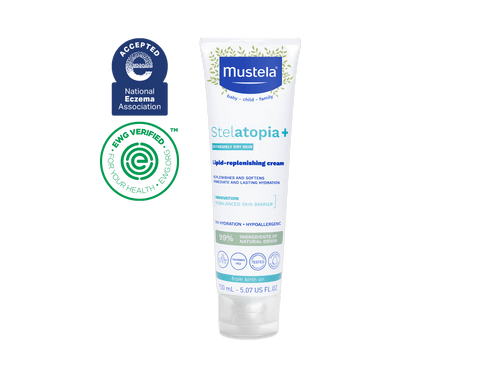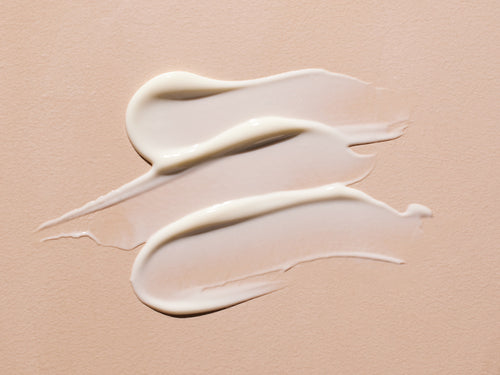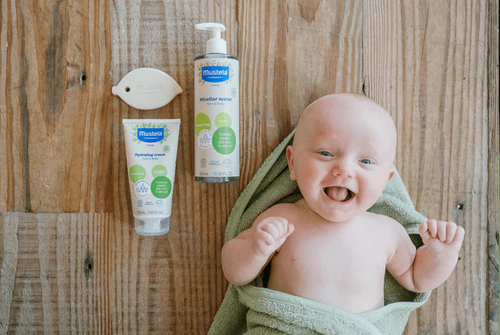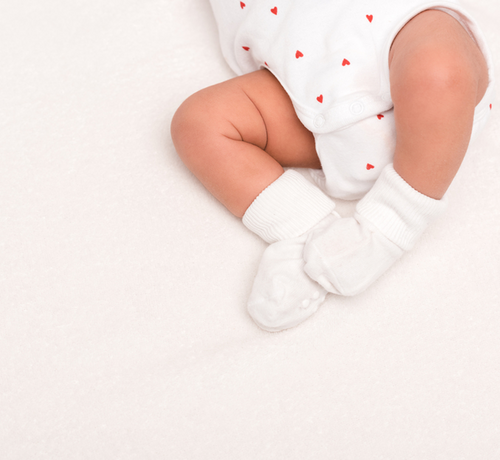As a new parent, you want your baby to be happy, healthy, and comfortable at all times. But what if your little one has sensitive skin? The clothes they wear, the temperature of the room, and even their mood can increase their skin’s sensitivity and make them uncomfortable.
So how can you treat this all-too-common condition, prevent irritation, and take care of your baby’s sensitive skin? The skin experts at Mustela reveal everything you need to know to keep your baby happy and content all day long.

What Is Sensitive Skin?
One of the most important facts you need to know if your baby has sensitive skin is that it is very common. So you can rest easy, knowing that there’s nothing wrong with your baby.
Your little one has been surrounded by liquid for the past nine months, so it may take some time for their skin to adjust to the environment outside the womb. During the first few years of your baby’s life, their skin will develop a protective layer composed of water and oil (a.k.a. the hydrolipidic layer). This doesn’t happen all at once, so some parts of your little one’s skin will be covered, while other parts will be uncovered.
These uncovered patches of skin can get red and irritated very quickly by factors that you, as an adult with a more developed hydrolipidic layer, don’t even notice. Thankfully, there are easy and effective ways to calm your baby’s sensitive skin and prevent irritation.
We’ll share our favorite skin care tips for babies with sensitive skin later on in this article. First, though, we’ll explore the common signs and symptoms of sensitive baby skin so you know what to look for.
Common Signs That Your Baby Has Sensitive Skin
Babies with sensitive skin develop a number of symptoms, including:
- Skin tightness
- Prickling
- Tingling
- Temporary redness
- Dry Skin
Obviously, your little one can’t tell you that their skin feels tight and tingly (other than by crying), so you’ll need to keep your eyes open for inflamed patches. When you see those, you can assume the first three symptoms are present as well.
What Triggers Sensitive Skin Reactions?

Recognizing and eliminating the triggers that cause your baby’s sensitive skin to become inflamed is one of the best ways to prevent irritation and keep your little one comfortable. Common irritants include:
- Pressure on your baby’s skin
- Friction (from clothing, blankets, bedding, and even your own rough skin)
- Heat
- Cold
- Wind
- Sun
- Abrupt changes in temperature
- Air pollution
- Harsh soaps and shampoos
- Perfumes
- Detergents
- Hard water
- Chlorinated water
- Anger
- Stress
- Intense emotion
Depending on your baby’s age, you won’t always be able to prevent the last three triggers from irritating your baby’s sensitive skin, but you can take steps to avoid the other 13. Here’s how.
How Should You Treat Your Baby’s Sensitive Skin?
There’s nothing mysterious or difficult about treating your baby’s sensitive skin. Treatment is typically composed of two types of activities:
- Eliminating triggers
- Applying products that prevent irritation
Here are some specific ways that you can keep your baby’s sensitive skin from getting irritated and causing discomfort.
1) Moisturize Your Baby’s Skin
Moisturizing your baby’s sensitive skin regularly is one of the best ways to keep it soft and smooth. Applying a gentle moisturizer helps create a barrier between external irritants and your baby’s delicate skin.
We recommend using products that are specifically formulated for your baby’s body and face, like Mustela’s Soothing Moisturizing Body Lotion and Soothing Moisturizing Face Cream.
2) Choose Soft, Breathable Fabrics

Clothing, blankets, and bedding are the most common triggers of discomfort and irritations. They are also the easiest to change. Choose soft, breathable fabrics like cotton, jersey knit, and fleece for your little one’s clothing and blankets. Cotton is usually the best choice for bedding because it’s easy to clean and it won’t make your baby hot while they sleep.
3) Protect Your Baby’s Skin From The Sun
You can help protect your baby’s sensitive skin by reducing exposure to the sun. The best way to do this is to apply a hydrating mineral sunscreen with an SPF of 50 or more whenever you and your little one go outside. If your baby is older and more mobile, you may want to apply a sunscreen while indoors to prevent the sunlight streaming through the windows from irritating your little one’s sensitive skin.
As a second layer of defense against the sun’s harmful UV rays, cover your baby’s skin with long sleeves, long pants or dresses, and a hat whenever possible. This will ensure maximum protection and keep your baby’s sensitive skin from getting irritated.
4) Keep Your Baby’s Sensitive Skin Clean

Dirt, dust, and pet dander are the most common causes of skin irritation in babies with sensitive skin. You can help protect your little one by vacuuming the floors and furniture where they spend most of their time (e.g., the nursery, the living room, the couch, your favorite chair).
It’s also important to keep your baby’s skin clean. But bathing them too often can lead to even more problems. That’s why we recommend applying a fragrance-free, no-rinse soothing cleansing water several times a day. Mustela’s No Rinse Soothing Cleansing Water is formulated with micellar water to dissolve dirt and impurities without stripping your baby’s skin of its natural oils.
5) Don’t Let Bath Time Cause Discomfort And Irritation
Your baby’s bath time presents a number of triggers that can lead to discomfort and irritation. Those triggers include:
- The number of times you bathe your little one
- The temperature of the water
- The cleansing product you use
- The towel and how you use it
When you bathe your little one, use a bath thermometer to keep the water as close to 97℉ (lukewarm) as possible. Use a gentle cleanser, like Mustela's Soothing Cleansing Gel, that contains a minimum number of ingredients and is free of soaps, fragrances, and preservatives.
After the bath, use a soft towel and gently pat—don’t rub—your baby’s skin dry. This will prevent the fabric from causing friction on your little one’s skin, which can lead to discomfort. Finally, supplement bath times with a micellar water-based cleansing water to keep your little one clean all day, every day.
6) Care For Your Baby’s Diaper Area To Avoid Irritation
One of the most sensitive parts of your baby’s body is their diaper area. It’s exposed to a lot of moisture and doesn’t get much air throughout the day. You can’t do a great deal about the diaper itself (unless you use cloth diapers), but you can keep your little one’s bottom as dry as possible and use products that prevent irritation and discomfort.
As with the other preventative methods and treatments on this list, choose products that are specifically formulated for very sensitive skin. We recommend:
- Mustela's Certified Organic Cotton Wipes with Water
- Mustela's Diaper Rash Cream 1 2 3
- Mustela's Liniment
Mustela’s Liniment cleans and moisturizes your baby’s skin every time you change their diaper. Apply the diaper rash cream after the liniment to create a moisturizing barrier that hydrates your baby’s diaper area and protects it from getting irritated.
All the products listed above leave your little one’s skin feeling soft and smooth so they can stay comfortable all day.
Your Baby’s Sensitive Skin Can Be Managed
There are two essential facts we want you to remember if your baby has sensitive skin:
- It is completely normal
- It can be soothed with the right products
For those reasons, there’s no need to be afraid of your little one’s sensitive skin. It may take a bit more effort for a while to keep your baby’s skin soft and smooth, but their health and comfort are worth it. And as your child gets older and their skin develops more fully, you may not need to worry as much about sensitive skin (although it’s always a good idea to keep your little one’s skin moisturized with the right lotion).
When your baby is comfortable and content, you can be comfortable and content as well. That’s good for everyone involved!




